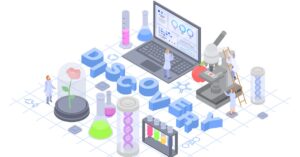When Auditing goes wrong
Is your genomics team keeping track of the open source tools it’s using? What about software version numbers and the parameters being set? Genome reference files, usage logs, the custom scripts bioinformaticians are deploying?
If you’re not tracking every detail in a mid- to large-scale NGS data analysis project, auditing will be an unequivocal nightmare.
Our enterprise and pharma clients express this concern when they’re first onboarded to the Basepair platform, and it’s something we’ve personally faced as bioinformaticians while working on projects in the past.
Multiple users + multiple tools = auditing and reproducibility issues galore.
Who added that sample? What program did they use? What exactly went into that custom script two years ago? Managers and HR need this data on hand at all times, but information tends to spill through the cracks, even in well-coordinated NGS analysis projects.
Data provenance can be frustrating if not done right from the start. That’s why audit trails come built-in with Basepair’s platform and API.
The NGS data audit trail
Audit trails are difficult to manage with manual NGS data analysis pipelines. The more moving pieces, the more work it takes to reproduce results and log workflows. So why not just reduce the amount of moving parts?
We created Basepair to allow teams to focus on NGS data analysis, without having to worry about tracking background processes. The platform automatically generates a log entry with each analysis, providing a traceback for what files and programs were used to generate the results.
Deeper Look: How automated workflows simplify NGS analysis
The Basepair log process:
- Teams who log into Basepair choose among popular or custom workflows for multiple supported NGS data types – including DNA-Seq/WGS/WES, RNA-Seq, ChIP-Seq/CUT&RUN/CUT&TAG, single-cell RNA-seq, or ATAC-Seq data.
- After some basic metadata and options are filled, researchers or bioinformaticians hit the Run Analysis button.
- Along with full report, a log file is generated and easily available for download.
- Scaling with our API? Logs are generated whether you’re using Python, CLI, or our GUI.
Deeper Look: Basepair API features
Future-proofing your NGS analysis
Basepair’s simple audit trail allows clinical teams to be prepared for FDA audits, and allows anyone to easily bring up logs months or years down the line. Researchers looking to reproduce results prior to publication will also have all details on hand via the Basepair platform.
We found a useful byproduct of automated logging on a single, seamless platform is that new hires can start using Basepair in minutes, while their auto-generated activity logs will be useful for future team members years down the line.
Deeper Look: Preparing your NGS data for reproducibility and auditing
Automating transparency
The Basepair team frequently audits their own platform. We ensure workflows are in-line with regulations like ACMG’s clinical laboratory standards, and tools and pipelines are up-to-date with the latest best practices.
This work translates to more transparent audit trails for your team.
Basepair’s automated logging has helped enterprise and pharma teams achieve seamless data provenance on NGS data analysis projects ranging from several hundred to several thousand samples.
Want to find out how Basepair’s platform and data provenance tools can help your team seamlessly generate audit trails? Contact our team to schedule a time to speak about our auditing capabilities.
